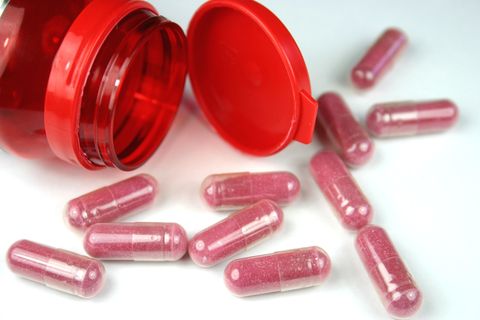
The stats don’t lie: 50% of women experience a urinary tract infection (UTI) at one point or another. And with each subsequent infection, your risk of a recurrent ones goes up, according to the National Institutes of Health. While the painful symptoms like burning or stinging with urination may seem bad enough, the risk of a dangerous kidney infection means this common condition can also become a scary (and expensive) experience.
Avoid developing UTIs in the first place with these tips from Dr. Sherry Ross, OB/GYN, author of She-ology: The Definitive Guide to Women’s Intimate Health. Your body will thank you.
Contents
- 1 1. PRACTICE GOOD HYGIENE WITH YOUR PARTNER.
- 2 2. ALWAYS PEE RIGHT AFTER SEX.
- 3 3. DON’T HOLD IT IN GENERAL.
- 4 4. DRINK LOTS OF WATER.
- 5 5. TRY CRANBERRY TABLETS.
- 6 6. TRY PROBIOTICS.
- 7 7. RECONSIDER YOUR METHOD OF BIRTH CONTROL
- 8 8. ALWAYS WIPE FRONT TO BACK.
- 9 9. DON’T DOUCHE.
- 10 WHAT TO DO IF YOU HAVE A UTI
1. PRACTICE GOOD HYGIENE WITH YOUR PARTNER.
Since sexually active women are most at risk for UTIs, it’s always important to take precautions during sex, Dr. Ross says. Anything going near your genital area should be as clean as possible, and that includes penises, hands, mouths, and toys.
“We’re anatomically more prone to bladder infections because of the way the bladder sits right above the vagina,” Dr. Ross explains. Since the urethra — the tube that drains urine from the body — is right near the vagina, it’s easier for unwelcome bacteria to get into the urinary system, leading to a possible infection in the urethra, bladder, or kidneys.
2. ALWAYS PEE RIGHT AFTER SEX.
There’s a lot of truth to this common piece of advice. Going to the bathroom ASAP can flush out any bacterial intruders before they wreak havoc on your system. If you don’t have access to a bathroom, Dr. Ross recommends using non-fragrant wipes like Huggies to clean up afterward.
3. DON’T HOLD IT IN GENERAL.
To that end, regularly waiting to go to the bathroom doesn’t help. Peeing frequently (ideally every of couple of hours) prevents that bad bacteria from developing in your urethra and bladder, whether you’re sexually active or not.
This is especially important for menopausal women, since a decrease in the amount of estrogen in your body can make you more vulnerable to infection, according to the Mayo Clinic.
4. DRINK LOTS OF WATER.
The best way to make sure you’re going to the bathroom enough? Getting the recommended eight to 10 cups of water per day. Staying hydrated can also boost energy levels, prevent headaches, and help your skin, so drink up.
5. TRY CRANBERRY TABLETS.
If you have recurrent infections, Dr. Ross says taking cranberry tablets daily can help keep your urinary tract healthy. While the research on cranberry juice curing infections is inconsistent, this added measure can’t hurt.
6. TRY PROBIOTICS.
Similarly, another safeguard against frequent infections is encouraging good bacteria to grow. Probiotic supplements or foods (think Greek yogurt, sauerkraut, and kimchi) all foster the beneficial kind.
7. RECONSIDER YOUR METHOD OF BIRTH CONTROL
A lot of factors go into deciding which contraceptive is right for you, but some types like spermicides, diaphragms, and sponges can up your risk of UTIs since they can trap bacteria in the vagina. Similarly, using a menstrual cup instead of tampons or pads during your period may also increase the likelihood, Dr. Ross says. If you’re getting a lot of repeat infections, talk to your gyno abouts switching to the pill or an IUD.
8. ALWAYS WIPE FRONT TO BACK.
It’s worth a reminder that you should always start with the vagina and wipe toward the rectum whenever you use the bathroom. This may prevent the spread of bacteria to where it shouldn’t be.
9. DON’T DOUCHE.
While good hygiene is important, be careful not to “overdo” it. “Anything that disrupts the balance of the vagina — feminine products with fragrance, or even douching — you don’t want to do because it gets rid of the good bacteria,” explains Dr. Ross.
WHAT TO DO IF YOU HAVE A UTI
While taking these precautions will certainly reduce your risk, always seek medical attention right away if you suspect you’ve developed a UTI. A doctor can determine whether you need an antibiotic or if another condition like interstitial cystitis or kidney stones is causing that pain and discomfort.
[“source=goodhousekeeping”]




